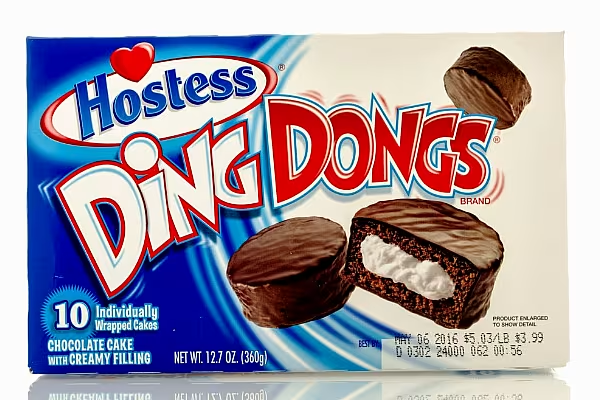Hostess Brands LLC, the baker of Twinkies and Ding Dongs, plans to become a publicly listed company, marking a revival for an iconic American baker that just three years ago was facing liquidation.
An acquisition vehicle linked to Gores Group LLC will provide $375 million to the deal, and other investors have committed $350 million in a private placement, the companies said in a statement Tuesday. Hostess’s current owners -- private equity firm Apollo Global Management LLC and investor Dean Metropoulos -- will hold a 42 percent combined stake in the vehicle, which will be renamed Hostess Brands Inc.
The deal marks a comeback for a brand that was close to extinction before Apollo and Metropoulos bought Hostess out of bankruptcy in 2013. Hostess was founded in 1919 and gained popularity with its cream-filled, swirled-icing cupcakes. In 1930, the company introduced Twinkies, a snack that became a mainstay of American supermarkets and popular culture.
“Hostess presents a unique opportunity to invest in an iconic brand with strong fundamentals that is poised for continued growth,” Gores Group Chairman and CEO Alec Gores said in a statement.
Hostess Value
Metropoulos will continue to serve as executive chairman and William Toler will remain chief executive officer after the deal is completed, which is expected in the third quarter. Gores said the new company will have an initial enterprise value of about $2.3 billion, 10.4 times its forecast 2016 adjusted operating profit of about $220 million. The company had about $650 million in revenue in the year ended May 31.
While the yellow sponge cakes have strong brand recognition, taking Hostess public will test investors’ appetite for a company that trades in the kind processed sugar that Americans are increasingly trying to avoid. That trend took a toll on Hostess in recent years, contributing to the company’s two bankruptcies in the past decade.
Hostess emerged from bankruptcy in 2009 under the control of buyout firm Ripplewood Holdings LLC and lenders. Previously known as Interstate Bakeries Corp., the company changed its name to Hostess Brands that year.
Bankruptcy Rescue
When Hostess again went under roughly three years later, Apollo Global Management LLC and C. Dean Metropoulos & Co. came to the rescue, paying as much as $410 million for the name. The new owners resumed production and expanded distribution, officially returning Twinkies to store shelves in 2013 after a seven-month hiatus. The Metropoulos family, which has purchased other American brands such as Pabst beer, dubbed the baker’s revival the “sweetest comeback in the history of ever.”
Hostess’s next chapter takes place as the U.S. food industry sees sales and profit slumping. Consumers are seeking out fresh and natural options, shifting away from processed grocery staples that dominated store shelves for decades. Changing consumer tastes have been hard on big packaged-food makers, with sugar in particular targeted as a health hindrance by U.S. consumers.
“It’s not in tune with where customers are going,” said Ken Shea, an analyst at Bloomberg Intelligence. “There will be a high level of scrutiny on their ability to grow.”
Hershey Deal?
Another deal for a maker of sweet snacks also is percolating, with weakness at Hershey Co. making that company a takeover target. Mondelez International Inc. said last week that it had made a bid for the chocolate maker, which Hershey rejected.
Despite foodmakers’ troubles, the uncertainty surrounding the recent Brexit vote and the U.S. election make the companies an attractive investment opportunity, Shea said. The Standard & Poor’s 500 packaged-food index had gained 14 percent this year through last week, compared with a 2.9 percent gain for the larger S&P 500.
“This is a vote of confidence that packaged food is an attractive place for investors,” he said. “It’s traditionally viewed as a place that money flocks to in times of uncertainty.”
News by Bloomberg, edited by ESM. To subscribe to ESM: The European Supermarket Magazine, click here.














